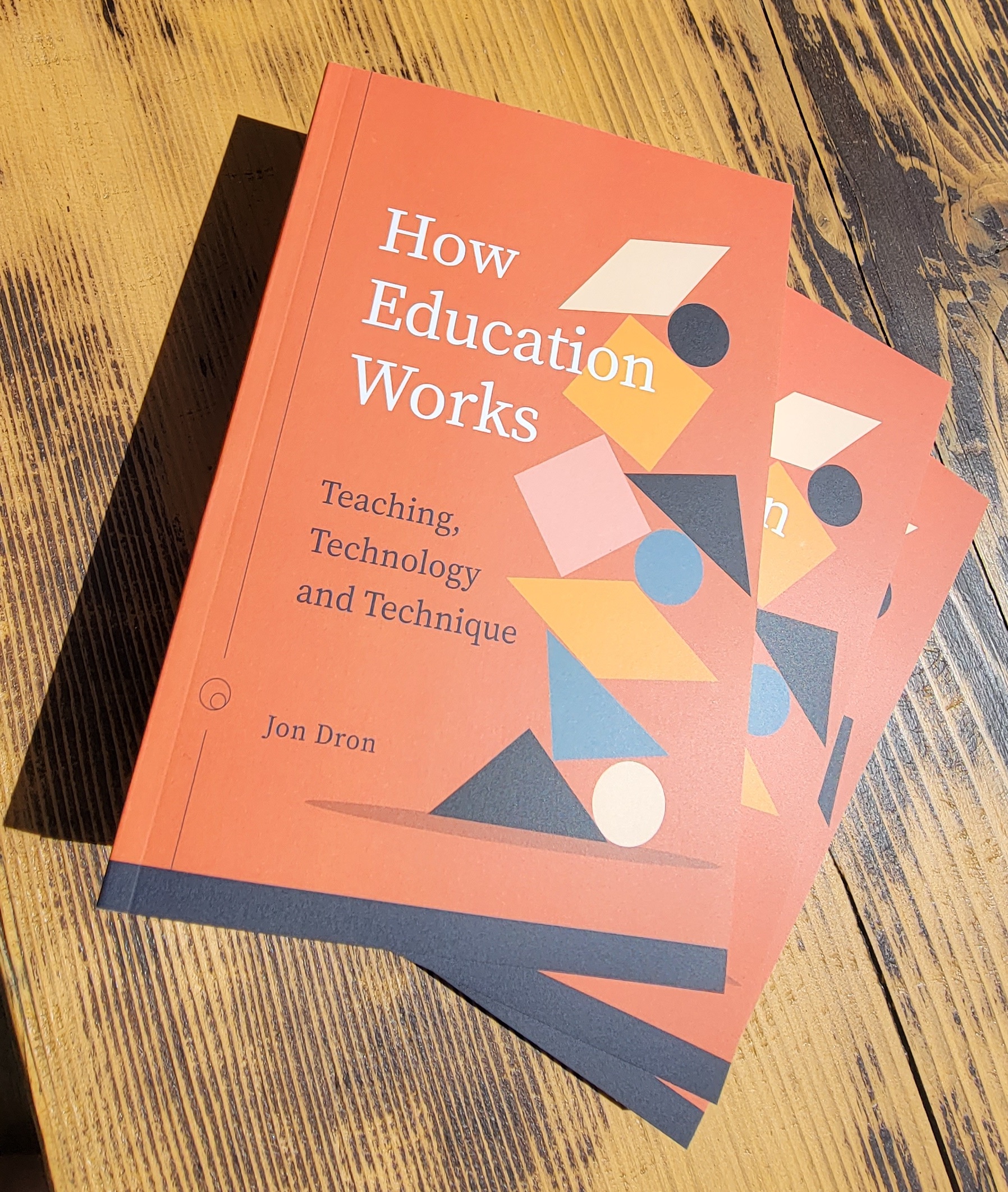 About 10 years ago I submitted the first draft of a book called “How Learning Technologies Work” to AU Press. The title was a nod to David Byrne’s wonderful book, “How Music Works” which is about much more than just music, just as mine was about much more than learning technologies.
About 10 years ago I submitted the first draft of a book called “How Learning Technologies Work” to AU Press. The title was a nod to David Byrne’s wonderful book, “How Music Works” which is about much more than just music, just as mine was about much more than learning technologies.
Pulling together ideas I had been thinking about for a few years, the book had taken me only a few months to write, mostly at the tail end of my sabbatical. I was quite pleased with it. The internal reviewers were positive too, though they suggested a number of sensible revisions, including clarifying some confusing arguments and a bit of restructuring. Also, in the interests of marketing, they recommended a change to the title because, though accurately describing the book’s contents, I was not using “learning technologies” in its mainstream sense at all (for me, poetry, pedagogies, and prayer are as much technologies as pots, potentiometers and practices), so it would appeal to only a small subset of its intended audience. They were also a bit concerned that it would be hard to find an audience for it even if it had a better title because it was at least as much a book about the nature of technology as it was a book about learning, so it would fall between two possible markets, potentially appealing to neither.
A few months later, I had written a new revision that addressed most of the reviewers’ recommendations and concerns, though it still lacked a good title. I could have submitted it then. However, in the process of disentangling those confusing arguments, I had realized that the soft/hard technology distinction on which much of the book rested was far less well-defined than I had imagined, and that some of the conclusions that I had drawn from it were just plain wrong. The more I thought about it, the less happy I felt.
And so began the first of a series of substantial rewrites. However, my teaching load was very high, and I had lots of other stuff to do, so progress was slow. I was still rewriting it when I unwisely became Chair of my department in 2016, which almost brought the whole project to a halt for another 3 years. Despite that, by the time my tenure as Chair ended, the book had grown to around double its original (not insubstantial) length, and the theory was starting to look coherent, though I had yet to make the final leap that made sense of it all.
By 2019, as I started another sabbatical, I had decided to split the book into two. I put the stuff that seemed useful for practitioners into a new book, “Education: an owner’s manual”, leaving the explanatory and predictive theory in its own book, now grandiosely titled “How Education Works”, and worked on both simultaneously. Each grew to a few hundred pages.
Neither worked particularly well. It was really difficult to keep the theory out of the practical book, and the theoretical work was horribly dry without the stories and examples to make sense of it. The theory, though, at last made sense, albeit that I struggled (and failed) to give it a catchy name. The solution was infuriatingly obvious. In all my talks on the subject my catchphrase from the start had been “’tain’t what you do, it’s the way that you do it, that’s what gets results” (it’s the epigraph for the book), so it was always implicit that softness and hardness are not characteristics of all technologies, as such, nor even of their assemblies, but of the ways that we participate in their orchestration. Essentially, what matters is technique: the roles we play as parts of the orchestration or orchestrators of it. That’s where the magic happens.
But now I had two mediocre books that were going nowhere. Fearing I was about to wind up with two unfinished and/or unsellable books, about half way through my sabbatical I brutally slashed over half the chapters from both, pasted the remains together, and spent much of the time I had left filling in the cracks in the resulting bricolage.
I finally submitted “How Education Works: Teaching, Technology, and Technique” in the closing hours of 2020, accompanied by a new proposal because, though it shared a theme and a few words with the original, it was a very different book.
Along the way I had written over a million words, only around a tenth of which made it into what I sent to AU Press. I had spent the vast majority of my authoring time unwriting rather than writing the book and, with each word I wrote or unwrote, the book had written me, as much as I had written it. The book is as much a part of my cognition as a product of it.
And now, at last, it can be part of yours.
30 months after it was submitted – I won’t go into the reasons apart from to say it has been very frustrating – the book is finally available as a free PDF download or to read on the Web. If all goes to plan, the paper and e-book versions should arrive June 27th, 2023, and can be pre-ordered now.
It is still a book about technology at least as much as it is about education (very broadly defined), albeit that it is now firmly situated in the latter. It has to be both because among the central points I’m making are that we are part-technology and technology is part-us, that cognition is (in part) technology and technology is (in part) cognition, and that education is a fundamentally technological and thus fundamentally human activity. It’s all one complex, hugely distributed, recursive intertwingularity in which we and our technological creations are all co-participants in the cognition and learning of ourselves and one another.
During the 30 months AU Press has had the book I have noticed a thousand different ways the book could be improved, and I don’t love all of the edits made to it along the way (by me and others), but I reckon it does what I want it to do, and 10 years is long enough.
It’s time to start another.
A few places you can buy the book
AU Press (CA)
Barnes & Noble (US)
Blackwells (UK)
Amazon (CA)
Amazon (JP)
University of Chicago Press (US)
Indigo (CA)
Booktopia (AU)






